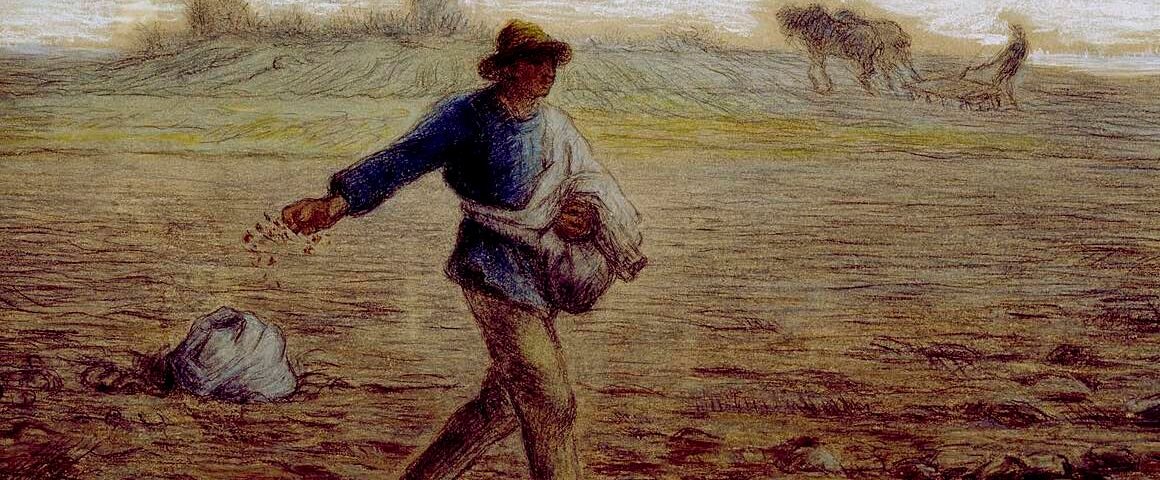The ones that fell on the good ground are those who, having heard the word with a noble and good heart, keep it and bear fruit with patience (Lk. 8:15).
How we understand the meaning and goal of life
The main barrier to spiritual growth is the temptation to look at life from the wrong perspective with the wrong standards of measure. The main errors of our time are to look at and assess everything in economic and consumer terms. The economic questions are, “How many?” and “How much money?” The consumer questions focus on, “Are you personally happy or satisfied?” In contrast, the Bible focuses on the growth of virtues like faith, hope, and love, which is referred to as “bearing fruit.”Anyone in parish ministry knows the ubiquity of the economic and consumer assessments. If someone asks about your church, the question is, invariably, how many members do you have? Too frequently, people assess their church experience by how it made them feel in the moment. Did I like the sermon? Did I like the music?
I am not advocating for bad sermons or bad music, but there is a critical distinction between one’s immediate reaction to a thing and the long-term impact of the thing on one’s growth and formation. For me, potato chips are always more immediately satisfying than vegetables; but vegetables contribute more to my long-term health. Likewise, spiritual formation requires that we learn to embrace things that are not as immediately satisfying because they are beneficial and formative over the long term.
The long-term focus of the Parable of the Sower and the Seed
The Parable of the Sower and the Seed in Luke 8:4-15 is the parable with which Jesus began his parable teaching ministry. In the gospel, Jesus stated his purpose for teaching in parables. He said, “To you (the disciples) it has been given to know the mysteries of the kingdom of God, but to the rest it is given in parables, that `Seeing they may not see, And hearing they may not understand.’” That is, “I’m telling parables to hide the truth.”
Jesus was not just being difficult. Rather, he was not rewarding the consumer. The disciples heard the parable and did not understand it. But they made the effort to approach Jesus and ask him to explain it. Most of the crowd that followed Jesus, by contrast, heard the story, didn’t understand it, and concluded, “I’m not listening to this teacher anymore. He tells stupid stories and we don’t know what they mean.” When following became difficult and required effort, many stopped following.
Genuine faith perseveres in the pursuit of knowing God. As Jesus said, “Ask, and it will be given to you; seek, and you will find; knock, and it will be opened to you. For everyone who asks receives, and he who seeks finds, and to him who knocks it will be opened” (Luke 11:9-10). This promise is the conclusion to a parable about perseverance in prayer. It is not a consumer promise. It doesn’t say, “Ask and you will be given next-day delivery.” It says, “Continue asking for however long is necessary.” Eventually, as your faith is shown to be genuine by your perseverance, you will begin to receive and find and the door will begin to open.
This long-term framework is assumed in the Parable of the Sower and the Seed. If you plant a seed it will take time to grow. You will have to tend it and protect it from predators, weeds, and weather. But if you plant a seed like a consumer and expect a beautiful flower or perfectly ripe fruit in a very short time, without any effort, you will be disappointed.
This suggests that we should not assess our practice of the faith in terms of whether it makes us feel good at any given moment. Rather, the concern should be whether our practice of the faith is producing what Galatians calls the fruit of the Spirit: “Love, joy, peace, longsuffering, kindness, goodness, faithfulness, gentleness, self-control” (5:22-23). Short-term experiences of pleasure or dissatisfaction should be assessed by how they relate to the long-term goals. For example, we may be going through a season of visible struggle, but God will use that season to cultivate new virtues and purify our hearts. Virtue is the long-term fruit of patient endurance through struggle. If we always demand immediate satisfaction, the fruit of genuine virtue will never be produced in us.
Similarly, how many people come to church on a given Sunday is a bad measure of God’s work in a place. A church can be small and grumpy or large and “happy” and not produce the fruit of the Spirit. The only important question is how the seed of God’s word and God’s Spirit, planted in baptism and received by faith, is growing and bearing fruit.
The challenge of reorientation and the opportunity of Lent
Though we can all readily identify and critique the consumer and economic assessment of everything, we are all influenced by it. It is “in the air” of our culture. Consequently, it takes a committed effort to retrain ourselves and learn a new perspective. When we don’t like something we encounter, we must practice taking a breath and considering how we might grow by purposely working through the uncomfortable thing with grace and patience. We must learn to look past surface numerical assessments and focus on God’s interior work in our hearts.
The parable highlights two dangers we can focus on in the upcoming season of Lent. First, the seed on the rocky soil fell away in time of temptation. It was not able to faithfully persevere through a season of uncomfortable testing in service to the long-term goal of growth. Second, the seed among the thorns was overwhelmed by the pleasures and cares of life. It was so caught up in its immediate happiness and satisfaction that it lost sight of God and his kingdom. It gained the world and lost its soul. Together, these seeds highlight the truth that having too little or too much happiness or profit are both potential distractions from the goal and telos of growing in the Spirit as we move toward the Resurrection and the life of the world to come.
Pre-lent focuses our attention on the long-term goal of Easter. Easter is not merely a future feast day. Easter is a new experience of resurrection that we enter into through a new experience of the cross. Our cross is the horticultural work we embrace in Lent. Lent is not just about “giving things up” or “saying more prayers”—although we need to fast and pray. A good Lent involves pulling weeds and reorienting life away from the idolatry of stuff and towards worship, prayer, and love for others in Jesus’ name.
We can consider over the coming days what is needed for the seed of God’s work to become more deeply rooted in our hearts. Lent will give us an opportunity for extended horticultural work toward the goal of long-term growth. As Jesus said in conclusion to our parable, “The ones that fell on the good ground are those who, having heard the word with a noble and good heart, keep it and bear fruit with patience.”







'Spiritual Growth: Reflections on the Parable of the Sower' has no comments
Be the first to comment this post!